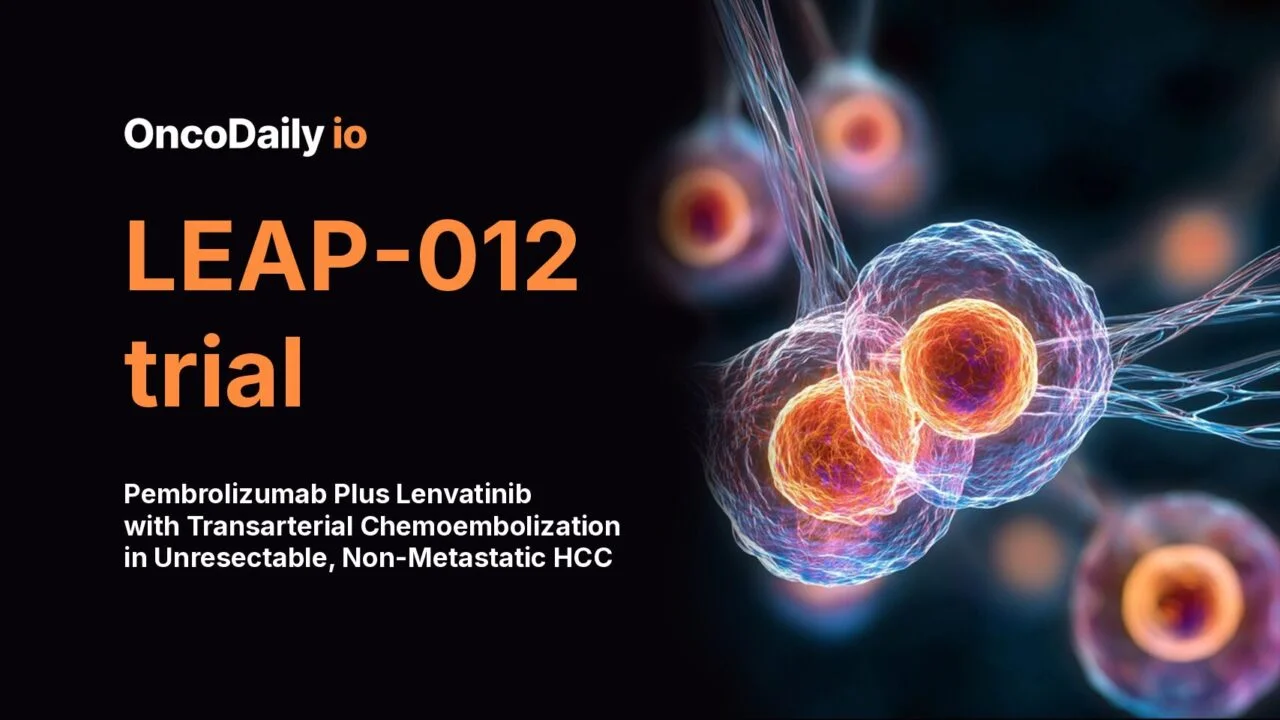LEAP-012 trial investigates pembrolizumab (KEYTRUDA®) plus lenvatinib (LENVIMA®) in combination with transarterial chemoembolization (TACE) versus TACE alone for patients with unresectable, non-metastatic hepatocellular carcinoma (HCC).
HCC remains among the most lethal cancers worldwide, and while TACE has long been the standard of care for intermediate-stage disease, progression within a year is common due to angiogenic and immunosuppressive escape mechanisms. Preclinical and early clinical data have suggested that combining immunotherapy, VEGF inhibition, and locoregional therapy may produce synergistic antitumor effects by enhancing antigen release, promoting vascular normalization, and strengthening immune activation.
Study Design and Methods
LEAP-012 was a multicenter, double-blind, randomized Phase 3 study enrolling 480 patients with unresectable, non-metastatic HCC not previously treated with systemic therapy.
Patients were randomized 1:1 to receive:
- Experimental arm: Pembrolizumab (400 mg IV every 6 weeks) + Lenvatinib (12 mg or 8 mg daily based on body weight) + TACE
- Control arm: Dual placebo + TACE
TACE was performed using chemotherapeutic and embolic agents delivered via the hepatic artery, beginning 2–4 weeks after initiation of systemic therapy.
Primary endpoints
- Progression-Free Survival (PFS) by blinded independent central review (BICR) per RECIST v1.1
- Overall Survival (OS)
Secondary endpoints: Objective response rate (ORR), duration of response (DOR), disease control rate (DCR), and safety.
Results
At the pre-specified interim analysis, KEYTRUDA + LENVIMA + TACE met the primary endpoint of PFS, demonstrating a statistically significant and clinically meaningful improvement compared to TACE alone. These findings, presented at ESMO 2024 and published in The Lancet, confirmed the biological synergy between immune checkpoint blockade, VEGF inhibition, and locoregional therapy.
However, the combination did not achieve statistical significance for overall survival (OS) compared with TACE alone. After internal review, Merck and Eisai determined that the probability of reaching the OS threshold at future analyses was low, leading to early study termination.
- PFS: Statistically significant improvement with the combination regimen versus TACE alone (per BICR; p < 0.001).
- OS: Did not reach protocol-defined significance; trial closed early for futility.
- Safety: Adverse events were consistent with known profiles of pembrolizumab and lenvatinib; no new safety signals were observed.
Interpretation
The LEAP-012 trial reinforces the biologic rationale of combining immunotherapy and VEGF blockade with TACE but highlights the challenge of translating radiographic progression benefits into survival advantage in intermediate-stage HCC.
Although PFS improvement was robust and reproducible, the lack of OS benefit suggests that earlier immune modulation may not meaningfully alter long-term outcomes in this disease stage, possibly due to the limited duration of systemic exposure and competing post-progression treatments.
Nonetheless, the findings contribute valuable insights into the integration of systemic and locoregional therapies and underscore the need for patient stratification, biomarker-driven selection, and optimization of treatment sequencingin HCC.

You Can Also Read About FDA Approves Subcutaneous Pembrolizumab with Berahyaluronidase Alfa-pmph
Regulatory Context
Despite the global trial closure, in June 2025, China’s National Medical Products Administration (NMPA) approved KEYTRUDA + LENVIMA + TACE for unresectable, non-metastatic HCC based on PFS benefit and clinical relevance in local patient populations.
The results do not affect existing approvals of the pembrolizumab–lenvatinib combination for advanced RCC, endometrial carcinoma, or HCC monotherapy indications.
Key Takeaway Messages
- LEAP-012 met its PFS endpoint but failed to show a statistically significant overall survival benefit versus TACE alone.
- Trial discontinued early based on low probability of meeting OS threshold at later analyses.
- Safety profile consistent with known pembrolizumab + lenvatinib experience; no new toxicities observed.
- Findings highlight the translational gap between improved tumor control and extended survival in intermediate-stage HCC.
- Reinforces need for rational combinations, biomarker-guided selection, and optimized systemic-locoregional sequencing in liver cancer management.
You Can Read Full Article Here


